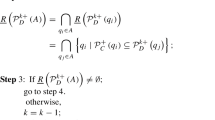Abstract
In this paper, we present a rough set approach to pairwise comparison tables for supporting decisions of multiple decision makers. More precisely, we deal with preference learning from pairwise comparisons, in case of multiple decision makers. Comparing to classical rough set approach, there are three main differences that are the following: we are learning a preference relation, so we have to work with a pairwise comparison table, while the classical rough set approach considers a classification table; we are taking into account a preference order in data, so we have to use the Dominance-based Rough Set Approach (DRSA), while the classical rough set approach based on equivalence relation does not consider such an order; we are taking into account multiple decision makers, while the classical rough set approach considers mostly a single classification decision provided by one decision maker only.
Access this chapter
Tax calculation will be finalised at checkout
Purchases are for personal use only
Preview
Unable to display preview. Download preview PDF.
Similar content being viewed by others
References
Greco, S., Matarazzo, B., Słowiński, R.: Rough sets theory for multicriteria decision analysis. European Journal of Operational Research 129(1), 1–47 (2001)
Greco, S., Matarazzo, B., Słowiński, R.: Decision rule approach. In: Figueira, J., Greco, S., Ehrgott, M. (eds.) Multiple Criteria Decision Analysis, State of the art Surveys, ch. 13, pp. 507–561. Springer, Berlin (2005)
Greco, S., Matarazzo, B., Słowiński, R.: Dominance-based rough set approach to decision involving multiple decision makers. In: Greco, S., Hata, Y., Hirano, S., Inuiguchi, M., Miyamoto, S., Nguyen, H.S., Słowiński, R. (eds.) RSCTC 2006. LNCS (LNAI), vol. 4259, pp. 306–317. Springer, Heidelberg (2006)
Inuiguchi, M., Miyajima, T.: Rough set based rule induction from two decision tables. European Journal of Operational Research 181(3), 1540–1553 (2007)
Jelassi, T., Kersten, G.E., Zionts, S.: An introduction to group decision and negotiation support. In: Bana e Costa, C. (ed.) Readings in Multiple Criteria Decision Aid, pp. 537–568. Springer, Heidelberg (1990)
Nurmi, H., Kacprzyk, J., Fedrizzi, M.: Probabilistic, fuzzy and rough concepts in social choice. European Journal of Operational Research 95(2), 264–277 (1996)
Pawlak, Z.: Rough Sets. Theoretical Aspects of Reasoning about Data. Kluwer Academic Publishers, Dordrecht (1990)
Słowiński, R., Greco, S., Matarazzo, B.: Rough set based decision support. In: Search Methodologies: Introductory Tutorials in Optimization and Decision Support Techniques, pp. 475–527. Springer, New York (2005)
Słowiński, R., Greco, S., Matarazzo, B.: Rough Sets in Decision Making. In: Meyers, R.A. (ed.) Encyclopedia of Complexity and Systems Science, pp. 7753–7786. Springer, New York (2009)
Author information
Authors and Affiliations
Editor information
Editors and Affiliations
Rights and permissions
Copyright information
© 2011 Springer-Verlag Berlin Heidelberg
About this paper
Cite this paper
Greco, S., Matarazzo, B., Słowiński, R. (2011). Dominance-Based Rough Set Approach on Pairwise Comparison Tables to Decision Involving Multiple Decision Makers. In: Yao, J., Ramanna, S., Wang, G., Suraj, Z. (eds) Rough Sets and Knowledge Technology. RSKT 2011. Lecture Notes in Computer Science(), vol 6954. Springer, Berlin, Heidelberg. https://doi.org/10.1007/978-3-642-24425-4_19
Download citation
DOI: https://doi.org/10.1007/978-3-642-24425-4_19
Publisher Name: Springer, Berlin, Heidelberg
Print ISBN: 978-3-642-24424-7
Online ISBN: 978-3-642-24425-4
eBook Packages: Computer ScienceComputer Science (R0)




